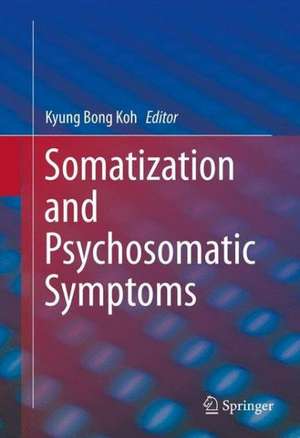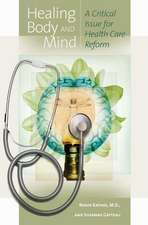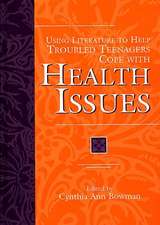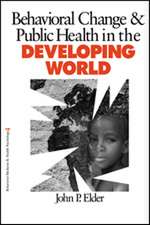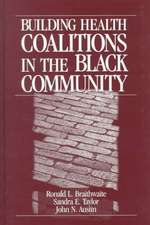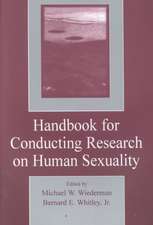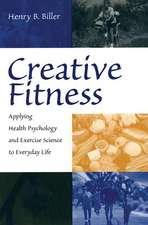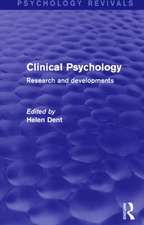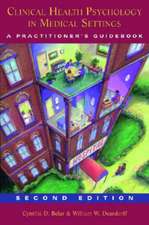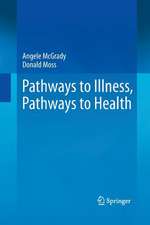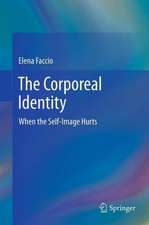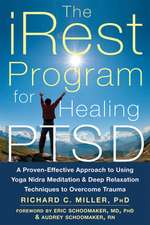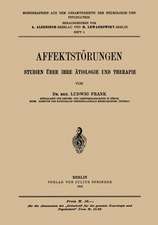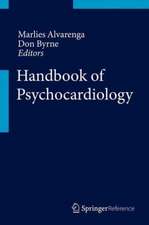Somatization and Psychosomatic Symptoms
Editat de Kyung Bong Kohen Limba Engleză Hardback – 18 iun 2013
| Toate formatele și edițiile | Preț | Express |
|---|---|---|
| Paperback (1) | 718.10 lei 6-8 săpt. | |
| Springer – 9 iul 2015 | 718.10 lei 6-8 săpt. | |
| Hardback (1) | 1040.68 lei 6-8 săpt. | |
| Springer – 18 iun 2013 | 1040.68 lei 6-8 săpt. |
Preț: 1040.68 lei
Preț vechi: 1095.44 lei
-5% Nou
Puncte Express: 1561
Preț estimativ în valută:
199.18€ • 207.16$ • 166.92£
199.18€ • 207.16$ • 166.92£
Carte tipărită la comandă
Livrare economică 13-27 martie
Preluare comenzi: 021 569.72.76
Specificații
ISBN-13: 9781461471189
ISBN-10: 1461471184
Pagini: 340
Ilustrații: XIV, 323 p.
Dimensiuni: 155 x 235 x 24 mm
Greutate: 0.65 kg
Ediția:2013
Editura: Springer
Colecția Springer
Locul publicării:New York, NY, United States
ISBN-10: 1461471184
Pagini: 340
Ilustrații: XIV, 323 p.
Dimensiuni: 155 x 235 x 24 mm
Greutate: 0.65 kg
Ediția:2013
Editura: Springer
Colecția Springer
Locul publicării:New York, NY, United States
Public țintă
ResearchCuprins
Part I Basic Understanding for Somatization.- Chapter 1 Identity of Somatoform Disorders: Comparison with Depressive Disorders and Anxiety Disorders.- Part II Theoretical Approaches to Mind and Body.- Chapter 2 Toward a Philosophy of Life to Underpin Personhood in Medicine.- Part III Biopsychosociocultural Mechanisms in Psychosomatic Medicine.- Chapter 3 Genes, Memes, Culture, and Psychosomatic Medicine: An Integrative Model.-Chapter 4 Alexithymia and Somatic Symptoms.- Chapter 5 Culture and Somatic Symptoms: Hwa-byung, A Culture-Related Anger Syndrome.- Chapter 6 Molecular Mechanism of Sleep-Wake Regulation: from Basic to Translational Research.- Part IV Practical Approaches to Patients and Family.- Chapter 7 Psychosomatic Approach to Clinical Practice.- Chapter 8 Emotional Intelligence, Alexithymia and the Doctor-Patient Relationship.- Chapter 9 Effective Approach to Somatization Assessment and Management.-Chapter 10 Role of Complementary and Alternative Medicine in Psychosomatic Medicine.- Chapter 11 Family Assessment and Intervention for Physicians.- Part V Specific Psychosomatic Symptoms.- Chapter 12 Pain, Depression and Anxiety: a Common Language of Human Suffering.- Chapter 13 Psychosomatic Aspects of Fibromyalgia.- Chapter 14 A Psychosomatic Approach to the Treatment of the Difficult Chronic Pain Patient.- Part VI Specific Psychosomatic Disorders.- Chapter 15 Stress-Induced Cardiomyopathy: Mechanism and Clinical Aspects.- Chapter 16 Poststroke Depression: Mechanisms and Management.-Chapter 17 Cancer in a Psychosomatic Perspective.- Chapter 18 Psychosocial Aspects of Breast Cancer: Focus on Interventions.- Part VII Specific Therapeutic Interventions and Biological Effects of Interventions.- Chapter 19. Motivational Interviewing in Psychosomatic Medicine.- Chapter 20 Wisdom and Wisdom Psychotherapy in Coping with Stress.- Chapter 21 Current Advances in the Psychopharmacology of Psychosomatic Medicine.- Chapter 22 Emotion, Interventions and Immunity.
Recenzii
From the reviews:
“This comprehensive, well-organized book covers a broad range of topics that may be used to develop an effective biopsychosocial approach to patient-centered care. … Clinicians in any area of medicine would gain insight from reading this book because of the ubiquitous presence of somatic symptoms. Particularly, primary care providers and mental health care clinicians would benefit from the comprehensive nature of this book especially in caring for their difficult to treat patients.” (Sheila Lahijani, Doody’s Book Reviews, January, 2014)
“This comprehensive, well-organized book covers a broad range of topics that may be used to develop an effective biopsychosocial approach to patient-centered care. … Clinicians in any area of medicine would gain insight from reading this book because of the ubiquitous presence of somatic symptoms. Particularly, primary care providers and mental health care clinicians would benefit from the comprehensive nature of this book especially in caring for their difficult to treat patients.” (Sheila Lahijani, Doody’s Book Reviews, January, 2014)
Notă biografică
Kyung Bong Koh, M.D., Ph.D. is a professor in the Department of Psychiatry at Yonsei University College of Medicine, Seoul, Korea. He is the author of Stress and Psychosomatic Medicine and has contributed chapters to several textbooks. His many published articles concentrate primarily on psychosomatic medicine, psychoneuroimmunology, somatization, and stress. He has developed a number of psychological instruments, including the Stress Response Inventory. He has received three academic awards for his distinguished research on the relationship between anger and somatization, immunology in anxiety disorders, and neural activity in panic disorder and somatoform disorder from the Korean Neuropsychiatric Association. He played a leading role in founding and also served as president of the Korean Society of Psychosomatic Medicine. He worked as chair of the Scientific Committee of the Society and was the first editor-in-chief of the Korean Journal of Psychosomatic Medicine. In addition, he served as chairperson of the organizing committee of the international academic meetings, such as the 13th Asian College of Psychosomatic Medicine and the 21st World Congress on Psychosomatic Medicine held in Seoul, Korea. He is a member of the International College of Psychosomatic Medicine and on the editorial board of Biopsychosocial Medicine.
Textul de pe ultima copertă
In these uncertain and disquieting times, clients presenting with stress problems are on the rise. Common, too, are those pains that refuse to go away--stomachaches, chest pains, and headaches that fall through the diagnostic cracks and resist appropriate interventions.
Somatization and Psychosomatic Symptoms brings theoretical clarity and frontline expertise to these challenging cases, offering integrative approaches and clinical tools.
This comprehensive reference addresses not only the assessment and treatment of chronic physical complaints but also explores the mechanisms that underlie them, expanding on current perspectives to create a biopsychosociocultural lens for practice. Specific symptoms and disorders are examined in depth, including stress-induced cardiomyopathy, post-stroke depression, and fibromyalgic pain. On the practice side, chapters review a gamut of interventions (from relaxation and mindfulness to systems and cognitive-behavioral), the therapeutic relationship, and the latest findings from psychopharmacology. Included in the coverage:
Somatization and Psychosomatic Symptoms brings theoretical clarity and frontline expertise to these challenging cases, offering integrative approaches and clinical tools.
This comprehensive reference addresses not only the assessment and treatment of chronic physical complaints but also explores the mechanisms that underlie them, expanding on current perspectives to create a biopsychosociocultural lens for practice. Specific symptoms and disorders are examined in depth, including stress-induced cardiomyopathy, post-stroke depression, and fibromyalgic pain. On the practice side, chapters review a gamut of interventions (from relaxation and mindfulness to systems and cognitive-behavioral), the therapeutic relationship, and the latest findings from psychopharmacology. Included in the coverage:
- A comparison of somatoform disorders with depressive and anxiety disorders.
- Genes, memes, culture, and psychosomatic medicine: an integrative model.
- Complementary and alternative treatment in psychosomatic medicine.
- Pain, depression, and anxiety: a common language of suffering.
- Motivational interviewing in psychosomatic medicine.
- Cancer: a psychosomatic perspective.
Caracteristici
Takes an integrative approach to concepts, mechanisms, assessment, and management of psychosomatic symptoms Bridges the translation of somatization research to clinical practice Based on presentations at the 2011 World Congress of Psychosomatic Medicine? Includes supplementary material: sn.pub/extras
